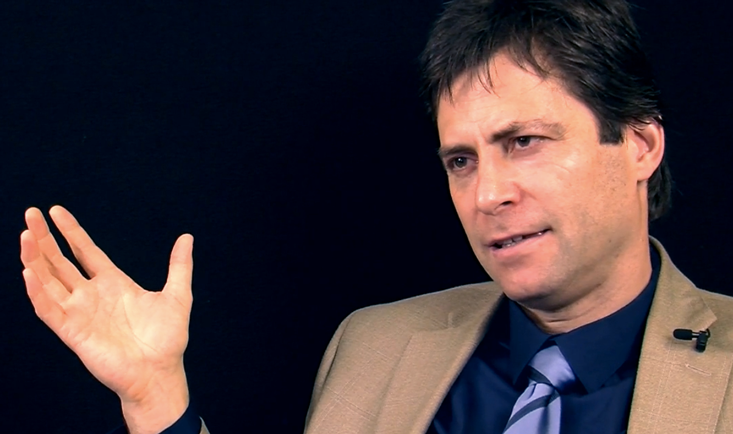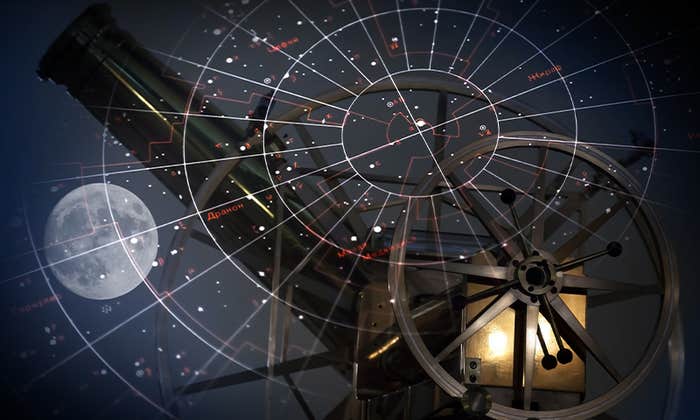In his book Our Mathematical Universe: My Quest for the Ultimate Nature of Reality, Max Tegmark writes that “time is not an illusion, but the flow of time is.” In this month’s issue of Nautilus, which looks at the concept of flow through various portals in science, we revisited our 2014 video interview with Tegmark (transcribed below for the first time), in which the professor of physics at the Massachusetts Institute of Technology explains why the feeling of time is one thing and the math quite another. That Tegmark, also the author of 2017’s Life 3.0: Being Human in the Age of Artificial Intelligence, takes the keenest pleasure from peering into the world through the kaleidoscope of his physics toolbox is amply clear. During our interview, leaning out of his chair, waving his arms, pouring his water bottle onto the carpeted hotel floor to drive home a point, he was in a constant state of animation, much like the objects (both microscopic and gargantuan) that he studies.

You say time doesn’t flow, but our subjective perception is that it does. Where do we go wrong?
It certainly feels to us like time is flowing. Yet that’s not the only way of looking at this reality. I could say that 10 to the power of 29 particles constitute me, and they are moving around in some very complicated patterns. Einstein pointed out that the most elegant way of describing this mathematically is to say, Let’s look at where each particle is in the three-dimensional space at each time, and draw this in a four-dimensional spacetime, where time is the fourth dimension.
If I have a particle that is part of my knee, which hasn’t moved, that particle corresponds to a line. At all times, it’s at the same place. If I look at a particle that’s part of a red blood cell, which has been constantly orbiting around my circulatory system, it’s making a super fascinating shape in spacetime. If I look at all my red blood cells together, they would make a braid pattern, making this incredible tangle in spacetime. If you look at the electron in my brain while I’m thinking, it’s even more complicated. But it’s still just a four-dimensional pattern. So I can either say that reality is a complicated pattern of four dimensions, or I could say it’s this stuff that feels like it’s changing and moving around. Which is more fundamental? Which is more correct? These are just two different ways of describing the same thing.
It’s funny how physics, like any field, has a small number of hot-button issues that people get very emotional about.
Is it part of the scientist’s job to explain why things feel the way they do?
We’ve seen a lot of examples of how things feel very different from the way they look in the equations. I would argue that almost all of the big breakthroughs in physics have this as their most difficult element. If you rewind to when Einstein came up with special relativity, you would find people like Lorentz and Minkowski had already written down a lot of the math. But Einstein was the guy who managed to figure out what it was going to feel like. He said if these are the equations, the way it’s going to feel is if you go near the speed of light, you’re going to feel time slowing down. And people said, Whoa, that’s really weird! Then they did the experiment and it’s correct. I had a fun conversation with physicist David Wineland. He told me that he’d built two atomic clocks that are super precise, and put one of them one foot below the other, and was able to measure that it runs slower!
Then quantum mechanics came along. It’s so complicated people still argue about it 100 years later! The math, though, is beautiful and clean. Randomness is fundamentally an illusion because there is no randomness in the math, even though it might feel random. I’m saying the same thing about time. Even though the flow of time is fundamentally an illusion, there is nothing flowing about the math, the equations aren’t changing, there is just a single four-dimensional pattern, albeit a very complicated and beautiful one, in spacetime. If you study it carefully, you’ll realize it’s going to feel like a flow of time. As physicists, that’s ultimately what we need to explain: Why does everything feel the way it does? We shouldn’t be so naive as to think that things will always feel the way they actually are, because the history of physics is a long sequence of examples of where we realize that the ultimate nature of things is very different from how they feel.
If time doesn’t flow, how do we understand the second law of thermodynamics, which says that time flows in the direction of increasing entropy?
It’s funny how physics, just like any field, has a small number of hot-button issues that people get very emotional about. Time and specifically the so-called second law of thermodynamics is one of them. It’s a simple statement that on average things keep getting messier. That lets you define the direction of time. But there has been a lot of controversy about it. On the one hand, there are people like Arthur Eddington, who tend to view this as almost a holy principle. It’s sacred and shouldn’t ever be questioned. He has this famous line where he says, Well, all sorts of things might turn out to be wrong, but if some theorist ever challenges the second law of thermodynamics, then too bad for that theorist, because there’s no hope for him other than the utmost humiliation! On the other hand, a lot of other people say, Look, we shouldn’t have any holy cows in physics, everything must be questioned, including the second law of thermodynamics.
It’s like the ending of Life of Brian, where they say, “You come from nothing, you’re going back to nothing. What have you lost?”
What’s questionable about the second law of thermodynamics?
It’s turned out you can derive the second law of thermodynamics from more fundamental things. Let’s say I did something clumsy like spill water on the carpet. If I played a video of it backward, and you saw the water come off the carpet and go into the bottle, it would look totally wrong. But if you just zoom in and look at the motion of the particles flying through the other particles of the air, it would look perfectly reasonable backward, just like a bunch of bowling balls bouncing the other way. After 100 years of thinking about this, we’ve come to realize the explanation is surprising. It has to do with what happened 13.8 billion years ago. The reason our universe keeps getting messier is because it started in a tidy state yesterday, which was even tidier the day before, and even tidier 13.8 billion years ago.
Why did the universe start in such a tidy state?
What I think that means is there is no holy era of time. It emerged. If, in the distant future, we find ourselves in a universe where all the stars have burned out, and all the black holes have evaporated, and all the radiation has been diluted by the dark energy that expanded our universe, and all we have is some very cold bath of photons here and there—basically thermal equilibrium; de Sitter space, as we call it—there will be no sense of time anymore. There will nothing you can do to determine whether time is going one way or the other. Time will then have un-emerged again. It will be like the poem, This is the way the world ends / Not with a bang but a whimper.
What if I looked at my wristwatch then? Would it tick forward?
There wouldn’t be a wristwatch because all the atoms, or all the protons in your wristwatch, would’ve decayed. All the particles that had decayed would’ve left the cosmic horizon. If there were a wristwatch, and it’s functioning, there will be a sense of time and change. But just like there hasn’t always been a wristwatch, there will not necessarily always be one.
How is measuring time related to the existence of time?
It sounds crass to say that time is what we measure with a clock. But it is a very deep fact that if there are no clocks—bearing in mind that every atom is a clock, in the sense that something is going around something else, which you can think of as a clock—then it’s not change which has gone but the whole ability to define time, and the whole ability to perceive time will also be gone. So in that way, time could’ve emerged from nothing, and might also go back to nothing. It’s like the ending of one of my favorite movies, Life of Brian, with Monty Python, where they say, “You come from nothing, you’re going back to nothing. What have you lost? Nothing!” Well, we’ll see!
Michael Segal is the editor at large of Nautilus.






























